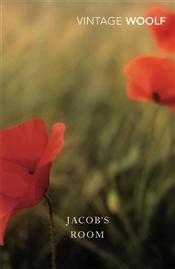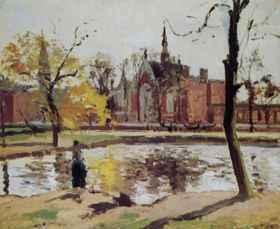Jacob’s Room, by Virginia Woolf
The thing about Jacob’s Room, before discussing its structure or characters or story or any of that, is that it has some of the most remarkably beautiful prose I’ve read in a very long time. This is a novel suffused with beauty; so that I had to pause reading from time to time just to take it in. Here’s how it opens:
“So of course,” wrote Betty Flanders, pressing her heels rather deeper in the sand, “there was nothing for it but to leave.”
Slowly welling from the point of her gold nib, pale blue ink dissolved the full stop; for there her pen stuck; her eyes fixed, and tears slowly filled them. The entire bay quivered; the lighthouse wobbled; and she had the illusion that the mast of Mr. Connor’s little yacht was bending like a wax candle in the sun. She winked quickly. Accidents were awful things. She winked again. The mast was straight; the waves were regular; the lighthouse was upright; but the blot had spread.
Through a prism of tears the blue ink becomes the sea. The text becomes dissolved in disquiet; the tears, the waves, the melting mast and quaking bay and lighthouse, the spreading blot. It’s a troubling start to the novel.

Jacob’s Room was published in 1922, a time when the memory of the Great War would still have been fresh both for Woolf and her readers. It’s set pre-war, and shows the development of a young man named Jacob Flanders (an ominous surname if ever there was one). Jacob grows up in Cornwall, goes to university in Cambridge, lives in London for a while, takes a holiday in Greece indulging his love of the Classics. He has friends, lovers, family, a life.
It would have been nearly impossible for any contemporary reader not to be aware of what was waiting for Jacob and his generation. Jacob’s Room looks at first like a Bildungsroman, Jacob’s coming of age tale, but many of Jacob’s generation never got to come of age. The Bildungsroman typically ends with the protagonist assuming their adult place in the world, putting aside their youthful errors and misunderstandings and finding maturity and with it a realisation of their burgeoning potential. The gas, the trenches, the machine guns, bayonets and artillery fire make a complete mockery of all that.
Woolf is of course one of the great Modernist writers, a description which probably does more to put off readers than anything else one could say of her. Jacob’s Room is a Modernist novel. The reader comes to know Jacob not so much directly as indirectly, through how others describe him, through places he’s been or seemingly unimportant incidents in his life. While Woolf occasionally reports Jacob’s speech directly or describes his thoughts it’s rarely anything revelatory. To the extent you piece Jacob together, you do so through the impression he leaves.
I noticed when preparing my notes for writing this that Woolf uses a particular phrase twice, near the beginning and again near the end of the novel (the second example is quoted near the end of this piece). Woolf writes “It is no use trying to sum people up. One must follow hints”. That’s the essence of her portrait of Jacob, but it’s also of course true of how we remember people more generally.
When I remember my grandparents I don’t think of important conversations we had or moments of great drama, I remember resonant fragments. I remember waking up before Christmas and seeing grandpa Kelly in my bedroom with a sack of presents, trying not to be seen; I remember playing cards with grandma Nettie in the holiday evenings; waiting for the bus as a small child with grandma Kelly; grandpa Jim one day asking me what kind of girls I liked (his answer was that he liked girls who liked him, he was a clever man).
I think describing something as Modernist puts many readers off, partly because it promises difficulty and partly because it makes it sound rather grand and austere. You perhaps have stream of consciousness which many dislike, though it’s not a necessary technique and it’s not one that’s used here. Jacob’s Room is closest if anything to an impressionist painting. It puts conventional narrative techniques aside to a degree, but no more than say Pissarro did the same with conventional painting. If you’re not daunted by Pissarro there’s no particular reason to be daunted by Woolf, or at least not by this Woolf.

By way of example of what I mean by an impressionist style, here’s Jacob on holiday, the reader back with yachts in blue seas:
The Scilly Isles were turning bluish; and suddenly blue, purple, and green flushed the sea; left it grey; struck a stripe which vanished; but when Jacob had got his shirt over his head the whole floor of the waves was blue and white, rippling and crisp, though now and again a broad purple mark appeared, like a bruise; or there floated an entire emerald tinged with yellow. He plunged. He gulped in water, spat it out, struck with his right arm, struck with his left, was towed by a rope, gasped, splashed, and was hauled on board.
Moments later Jacob loses overboard the copy of Shakespeare’s works he’s been reading, the pages drifting apart in the water. It’s a moment you could easily read considerable symbolism into, but it’s also the sort of minor accident that life is filled with. As Woolf says later in the text, “the observer is choked with observations.” Everything here seems meaningful, but only because it’s been singled out to be shown when so much is left out.
Woolf places Jacob among his peers; showing idle conversations in Cambridge rooms, arguments and affection. The young men shine, their beauty illuminated by Woolf’s gaze. Jacob himself seems to have shifting futures ahead of him, all the things he could become. He has the potential to one day be a writer, a scholar, perhaps a statesman. The classic Bildungsroman makes its hero’s story arc seem inevitable, but after the Great War it must have been miserably apparent how remorselessly contingent our lives actually are. Jacob and his friends are washed away, made generational flotsam by others’ carelessness.
In the end, it’s hard to say anything definite about Jacob. Even the title alludes to his room rather than the man himself, because ultimately all that can be described is the places and people who were shaped by his presence among them. The Jacobness of him is unknown and unknowable, any attempt to capture it can only be pitifully partial:
It is no use trying to sum people up. One must follow hints, not exactly what is said, nor yet entirely what is done. Some, it is true, take ineffaceable impressions of character at once. Others dally, loiter, and get blown this way and that. Kind old ladies assure us that cats are often the best judges of character. A cat will always go to a good man, they say; but then, Mrs. Whitehorn, Jacob’s landlady, loathed cats.
In what becomes another subversion of the Bildungsroman genre, it becomes apparent that Jacob isn’t necessarily particularly exceptional. He’s a young man of his time and situation. His thoughts aren’t shown to be especially insightful or original, his undergraduate passions and enthusiasms are precisely that, undergraduate. He’s important mostly to his mother, but then so are most of us. He matters, because people matter and because there are people he matters to.
Kill Jacob or any of his generation at 80 and his potential would be fulfilled (or wasted, which is still a form of completed narrative), his path made inevitable by hindsight. Kill him at 20 and all we’re left with is an absence, a space where a person should be, a room that used to be his filled with objects made irrelevant.
Other reviews
Anthony of Time’s Flow Stemmed wrote an entire blog post on the first paragraph alone, which can be found here and which is worth reading as he draws a fair bit out of it (but without in my view reading too much into it). Anthony writes a little more on the book more generally here. Novelist Jonathan Gibbs reviewed the book as part of his reading of Melville House’s Art of the Novella series, his thoughts are here (though why Melville considered this a novella is utterly beyond me, I don’t see any sense in which it is). Anthony also linked to this tremendous review from a blog previously unknown to me which is very much worth reading.
Filed under: English Literature, Modernist Fiction, Woolf, Virginia Tagged: Jacob's Room, Virginia Woolf

